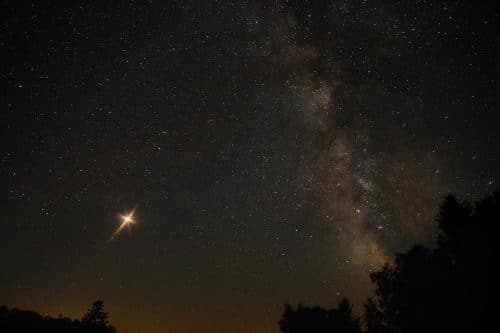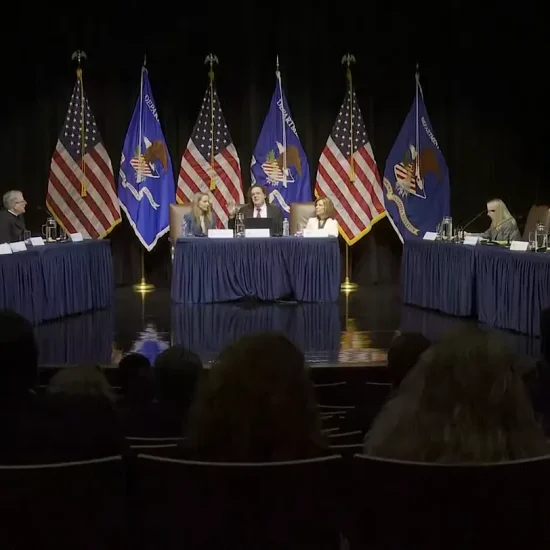
One Womanist’s Reflection on Epiphany in the Shadow of Insurrection
As a Womanist New Testament scholar, my hope is to make my own corner of the world a better place as I read New Testament texts with an eye to pressing cultural issues. As I read Matthew 2:1-12 in this season of Epiphany and reflect upon the upcoming anniversary of the Jan. 6, 2021, insurrection against the Capitol, I ask and title this reflection, “Who are you following?” Specifically, I offer reflections on the importance of experts and their roles both in the Ancient Near East and in contemporary society. Second, I offer reflections on the importance of leadership that actually shepherds without causing obsequious or riotous behavior.

Angela N. Parker
On Jan. 6, 2021, the nation watched as a mob of supporters of former President Donald Trump stormed the Capitol in Washington, D.C. These supporters subsequently attacked a number of members of the Capital police force, killing one and injuring others. These supporters breached the room where members of Congress were certifying the November 2020 election results. Before the events of Jan. 6, many Twitter followers of the former president received his now infamous tweet stating, “Big protest in D.C. on January 6th. Be there, will be wild!” Many turned out and proved to the nation and the world how “wild” they could be.
Reading Matthew 2:1-12 with the anniversary of the Jan. 6 insurrection provides textured analysis pertaining to the role of experts in ancient and contemporary society and the manifold ways that leadership occurs. Matthew 2:1-12 opens with Magi from the east coming into Jerusalem to ask about the birth of the Christ. In scholarship concerning the Magi, there are two schools of thought. First, the Magi were considered masters of astronomy, i.e. experts in their own fields who were well versed in stars, interpretation of dreams, and various occult arts.
However, Albert de Jong persuasively argued that the Magi were experts in “king-making.” De Jong’s scholarship on Iranian tradition highlights the role the Magi played in establishing the lineage of the dynastic kings within the Persian empire for a number of centuries. Since the gospel writer plays extensively with the failure of King Herod to understand what was going on, the gospel narrative frames the Magi as experts who have distinct knowledge on proclaiming kings. The narrative highlights the Maji as royal experts and king-makers as opposed to simple followers of stars.
But why is the conversation of expertise in king-making important? The Jan. 6 rioters carried signs and images declaring Trump as President and Jesus as Lord/King. But if we take the Magi seriously as expert king-makers, the insurrectionist ways of the Jan. 6 rioters were neither expert nor knowledgeable about the political process that certifies legitimate election results. Our beloved biblical text demonstrates the importance of experts. At a time when intellectual acumen becomes equated with the ability to “copy-paste” or “Google search,” attention to specialized expertise becomes of utmost importance.
Society needs experts who serve as Gramscian organic intellectuals, both traversing language in common society while engaging in highly academic circles. Society needs to listen and adhere to experts in Constitutional law, public health, and even in, dare I say, critical race theory. Experts must stand ready to speak to the cultural moments in which we find ourselves without elitist language that demeans and devalues members of society no matter their educational level. Society needs experts who can offer their gifts to the Josephs and Marys of the world, parents of future members of a civilized society.
Knowing that the Magi were experts in king-making in their time period, I continue reading Matthew 2:1-12 with an eye to the language of manifestation or appearance. Christians celebrate the season of Epiphany as the divine manifestation of Jesus to both Jewish and non-Jewish groups. As I re-read the passage, I note that the word for “appear” or “manifest” appears in Matthew 2:7. In the NRSV, this verse reads “(t)hen Herod secretly called for the wise men and learned from them the exact time when the star had appeared.”
Specifically, Herod was attempting to precisely determine the time of the appearing star (Greek: ton chronon tou phainomenou asteros). The Greek word phainomenou (from the Greek verb phaino) is a present passive participle that modifies the word “star.” Linguists recognize the word “epiphany” as a cognate of phaino. In essence, I would argue that the star is the “star” of the Epiphany story since the Greek term astera appears four times in the narrative. The star is an active and prominent part of this story.

Gage Smith / Unsplash
As an active member of the story, the star guides the Magi to King Herod for a reason. And after the Magi’s conversation with King Herod, the star appears again and then guides the Magi to the child Jesus. In my re-reading, I had to ask: Why would the star guide the Magi to Herod first and not directly to Jesus? Pondering a possible answer, I researched the misquoted Micah 5:2 text.
John Nolland argued that the citation in 2:6 is not at all close to the Septuagint (i.e. the Greek version of the Old Testament). The word for “ruler” (Greek ἡγεμών) in the Matthew quotation replaces the language of “one of the little clans of Judah” thereby signifying a focus on leadership. Additionally, it seems that the gospel writer merged elements of Micah 5:1 and 2 with 2 Samuel 5:2 with the addition of “will shepherd my people Israel.” What does the gospel writer want the star to impart to both the Magi and subsequent readers?
With this exegetical research, I would conjecture that the star wants the Magi to recognize the role of godly kings. Kings are not to act in ways that rule without shepherding. Shepherds walk with their people. There are parallels between Herod and Trump in this analysis. Had King Herod really wanted to worship the baby Jesus, he would have walked with the Magi to worship.
In his speech on Jan. 6, Trump declared, “We’re going to, we’re going to walk down Pennsylvania Avenue. I love Pennsylvania Avenue.” Further, he stated, “Now, it is up to Congress to confront this egregious assault on our democracy. And after this, we’re going to walk down, and I’ll be there with you, we’re going to walk down, we’re going to walk down.”
However, we know that he never walks with the rioters down Pennsylvania Avenue. Just as star leads the Magi to King Herod and to King Jesus, readers of this Epiphany text realize that following the star may lead you to places where you recognize fake leaders while expecting the manifestation of the true leader, Jesus. So, who are you following?
Angela N. Parker, Ph.D. is assistant professor of New Testament and Greek at Mercer University’s McAfee School of Theology, Atlanta, GA. She has written many articles and essays and is the author of If God Still Breathes, Why Can’t I? Black Lives Matter and Biblical Authority (2021). Dr. Parker is ordained with the Missionary Baptist Association.






